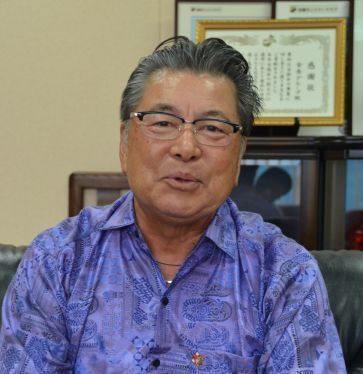Morimasa Goya hopes prefectural referendum on Henoko base issue sparks conversation between opposing sides

Morimasa Goya is heading a civil movement to vote on the Henoko base issue. July 18, at the Kanehide Office in Nago
July 24, 2018 Ryukyu Shimpo
By Shoichiro Yonamine
The Henoko Okinawa Referendum Committee, which is aiming to put a prefectural referendum on the ballot asking whether or not to allow new base construction in Henoko, Nago, succeeded in collecting 60,000 signatures for their petition by the July 23 deadline.
Having well surpassed the minimum 23,000 signatures, representing 2% of eligible voters in Okinawa, the referendum is closer than ever to becoming reality.
We interviewed committee advisor Morimasa Goya (Kanehide Holdings Co., Ltd. Chairman) about the committee’s goals among other things.
– Tell us about the disagreement on the policies surrounding the referendum, resigning from the All-Okinawa Coalition, and joining the civil movement.
“In particular, the defeat in the January Nago mayoral election was big. During Onaga’s term as governor, we continue to lose mayoral elections.
The prime minister has been harping on this as if they had received tacit acceptance regarding the Henoko issue from the faction that had chosen to withdraw from making elections their battlefield.
If that is what they think, they should set the stage to hear the consensus from the Okinawan people directly.
Of course, creating the opportunity to ask the people of Okinawa their consensus is our greatest weapon, and my proposition was to use it as an effective means to revoke the permission for land reclamation work.
There are some who argue that the gubernatorial and national elections also reflect the will of Okinawans, and that it comes at no risk.
Resigning from the All-Okinawa Coalition was recognizing and cutting from my body a part of me that had become “necrotized” before it could spread to the rest of my body.”
– How have you come to view the movement formed by political amateurs?
“I think the idea was for us to be involved with the debate for our future, and see it to a solidified conclusion.
The manpower and money are overwhelmingly insufficient. However, our pure-heartedness has carried the message.
The condensed dissatisfaction and uneasiness in the people of Okinawa that is now spreading has through the petition led to many people coming to our side.
It has become the far-reaching actual All-Okinawa.
I think this civil movement has now come to an important crossroad.”
– What are your thoughts on realizing this referendum?
“If those in favor stay silent, and we overwhelm them lopsidedly, it cannot be truly called a victory.
I want to engage them in deeper discussion, and in that depth notice the discrepancies in their argument.
Those discrepancies may exist for us as well.
For that reason I am calling on those in favor of the ruling parties land reclamation work in Henoko to organize.
Without fail, we will do the same.
Bringing life to the debate is the most important thing of all.
One thing I am concerned about with regards to the actual referendum is the question itself.
In addition to ‘yes’ and ‘no,’ I do not want there to be a selection for ‘undecided.’ I want for each Okinawan to bring their spirit and their resolve, and show without retreat what kind of legacy they want to leave for their children and grandchildren.
This may be a bit of an intrusive question. However, I think it is the obligation of each and every living Uchinanchu today.
I want this to be the point that ends the division and opposition between Okinawans, and moves us along to the next debate.”
(English translation by T&CT and Sam Grieb)
Previous Article:Signature-gathering campaign collects over 33,722 signatures to hold prefectural referendum
Next Article:Ryukyu Shimpo Ikemiyagushiku Shui Award goes to group that released 2014 Okinawa statement
[Similar Articles]
- Former members of referendum association meet, plan to ask prefectural government to re-revoke land reclamation permit
- Morimasa Goya resigns from All-Okinawa Coalition but will continue opposing Henoko base
- Iwate’s Prefectural Assembly first besides Okinawa’s to request Henoko land reclamation halt
- 10,000-person rally in Naha calls for honoring of the referendum result and abandonment of the Henoko base construction
- Governor Tamaki announces February 24 prefectural referendum, encourages participation
 Webcam(Kokusai Street)
Webcam(Kokusai Street)


